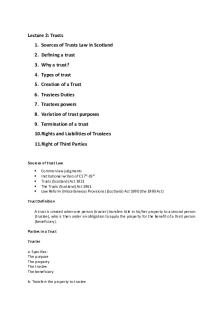Anomie - notes PDF

| Title | Anomie - notes |
|---|---|
| Course | Crime, Theory, And Practice |
| Institution | Southern Illinois University Edwardsville |
| Pages | 3 |
| File Size | 70.7 KB |
| File Type | |
| Total Downloads | 4 |
| Total Views | 130 |
Summary
notes...
Description
Anomie/ strain theories - Durkheim - Merton - Agnew - Messner and rosenfeld -
-
Like social disorganization anomie/strain theories are premised on the idea that society or individuals lack the proper controls on crime - Broader control on group Anomie/ strain theories also point to a problem in societal structure, particularly a goal/means disjuncture (what an individual is expected to achieve and what they actually can achieve) - Control on individuals
Durkheim (suicide) - Social changes in society can occur very rapidly, rupturing social structure - Society can not restore the balance fast enough - Anomie ensues (normalness) and people cannot achieve cultural aspiration
Those five modes of adaptation include conformity, innovation, ritualism, retreatism, and rebellion.
Robert K Merton - Anomie is not an anomaly, but a constant feature of societies - In balanced society, cultural norms about achieving goals are in line with the means of achieving them - Financial success - Issue: giving everyone opportunities to achieve that - The problem is that in many societies cultural norms and ways of achieving these norms are not equally distributed - When you can't as individual achieve cultural goal, can come up with adaptation; coping with goals calling disjunction - Conformity: accept cultural goal and accept institutional means - More financial independent, cultural goal may not be attainable - Innovation: accepts cultural means of financial independence and rejects institutional means of doing things to be financially independent - Problematic - Substitute cultural goal: w selling drugs on corner - Criminological POV: the problem - Ritualism: rejects cultural goal and accepts institutional means - Realization that cultural goal is not attainable, does not change way behave - Retreatism: rejects cultural goal and rejects insiturational means - Cultural goal unattaiable, not going to school not worried about financial independence - Criminological POV: not that worried - Could be minor delinquency - Rellion: replace w new cultural and institutional - Political issues - Need different cultural goals and instituted means Agnew: General strain theory - Refinement of the work of merton and others - There are more types of stain than a goal/means disjuncture - 1. Failure to achieve positively valued goals; traditional anomie idea - 2. Denial or removal of previously attained positive achievements: stressful life events - Divorice, break up - 3. Exposure to negative stimuli: ex - prior victimization
-
Strain does not mean an individual will become a delinquent, but it pressures one towards it Adaptation can include - Ignoring or minimizing strain; make it less problematic in life - Taking responsibility; not let it affect it - Taking revenge - Escaping from strain; do something else
Messner and rosenfeld: crime and the AMerican dream (institutional anomie) - American culture promotes striving for economic success but society does not provide equal means of achieving that wealth - Some institutions (family, church, school welfare) are currently in a state of anomie as they are undermined by the cultural goals of economic success - Cultural ideal of self interest - Strong the disjuncture that has arisen between cultural goals and the means to achieve them - This theory has been used to explain the higher crime rate in the US compared to other countries Problems with anomie/strain theories - Middle class bias assume that everyone wants to become wealthy - Reliance on offical statistics ignoring criminalzation process - Ignoring individual differences...
Similar Free PDFs

Anomie
- 3 Pages

Anomie - notes
- 3 Pages

Anomie
- 2 Pages

Anomie Theory
- 2 Pages

Merton\'s anomie theory
- 2 Pages

Notes
- 18 Pages

Notes
- 12 Pages

Notes
- 61 Pages

Notes
- 35 Pages

Notes
- 19 Pages

Notes
- 70 Pages

Notes
- 6 Pages

Notes
- 35 Pages
Popular Institutions
- Tinajero National High School - Annex
- Politeknik Caltex Riau
- Yokohama City University
- SGT University
- University of Al-Qadisiyah
- Divine Word College of Vigan
- Techniek College Rotterdam
- Universidade de Santiago
- Universiti Teknologi MARA Cawangan Johor Kampus Pasir Gudang
- Poltekkes Kemenkes Yogyakarta
- Baguio City National High School
- Colegio san marcos
- preparatoria uno
- Centro de Bachillerato Tecnológico Industrial y de Servicios No. 107
- Dalian Maritime University
- Quang Trung Secondary School
- Colegio Tecnológico en Informática
- Corporación Regional de Educación Superior
- Grupo CEDVA
- Dar Al Uloom University
- Centro de Estudios Preuniversitarios de la Universidad Nacional de Ingeniería
- 上智大学
- Aakash International School, Nuna Majara
- San Felipe Neri Catholic School
- Kang Chiao International School - New Taipei City
- Misamis Occidental National High School
- Institución Educativa Escuela Normal Juan Ladrilleros
- Kolehiyo ng Pantukan
- Batanes State College
- Instituto Continental
- Sekolah Menengah Kejuruan Kesehatan Kaltara (Tarakan)
- Colegio de La Inmaculada Concepcion - Cebu


